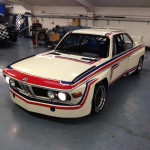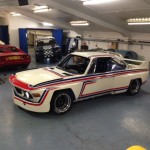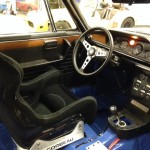


BMW
2800 CS Alpina
When this 2800CS left BMW it was a road car in
metallic Tundra Green. Exactly what Alpina did to the car prior to
the Spa 24 hour race we don’t know. From the photographs we can see
the standard alloy wheels have had the centre caps removed and
racing tyres fitted. A straight through, side exit exhaust was
fitted which would have no doubt complimented a tuned engine. The
bumpers had been removed, a roll cage is also visible and four spot
lights were fitted to the front. The car performed exceptionally
well finishing 9th overall and 8th in class. It was immediately
obvious that the E9 Coupe and its straight six engine had huge
potential. After the race Alpina offered to buy the car from BMW
along with three others and all four were prepared for the 1970
European Touring Car Championship. The regulations allowed a small
“bubble” wheel arch extension which all cars received along with the
now legendary orange and black livery. Traces of the original Tundra
Green and Alpina’s orange paint have been found on many components
during the restoration. The regulations allowed for the engine
capacity to be increased to 3 litres and all four cars ran triple
Weber DCOE carburettors. Alpina campaigned the cars throughout 1970
with this car scoring a pole and a win with Alex Soler-Roig at the
Salzburgring. For the 1971 season Alpina sold the car to privateer
Jens Winther who went on to win the Danish Touring Car Championship
outright with three wins and five 2nd place finishes. 1972 only saw
the car race once in a DRM race at Diepholz. The car did not compete
in 1973 and was eventually sold in October to Finnish driver Tuisku
Urpiala. After a visit to Alpina in Germany, Urpiala decided to
strip the car down and rebuild it to the latest Group 2 BMW 3.0 CSL
specification. He ordered all the necessary parts from Alpina
including a 360 bhp 3.5 litre race engine with slide throttle fuel
injection, modified front and rear subframes and suspension,
progressive coil springs, Bilstein dampers, adjustable anti-roll
bars, aluminium brake disc supports and a differential cooler and
pump. The bubble arches were removed and replaced with larger Group
2 arches and the interior was removed apart from the dashboard,
headlining and door cards. The standard gauge panel was replaced
with a custom gauge panel and Smiths Chronometric rev counter. The
body shell was partially stripped at this point. Our investigation
has revealed that the outside of the car was striped to bare metal
but the windscreens were left in place. Traces of the original paint
were found behind the window rubbers. A full set of CSL aluminium
doors, bonnet and boot lid were fitted. The inside of the car was
painted blue with the exterior in white with some intricate blue and
red stripes. The CSL aerodynamic kit was added, which included the
boot lid spoiler, rear wing and roof spoiler. Elaborate pipe work
ran through the interior to transport fuel and oil and a new 8 point
aluminium roll cage installed. The car was prepared for the 1974
Finnish Championship where Tuisku Urpiala finished 2nd overall. He
returned with the car in 1975 and 1976 winning the championship in
both years. From 1976 very little is known. At some point a set of
very wide Group 5 wheel arches and wider wheels were fitted to the
car but the car did very little from this point until it was
re-discovered prior to our restoration. It was decided that the car
had to return to its Group 2 CSL specification as campaigned by
Tuisku Urpiala in Finland as 99% of that car was present and intact.
Almost all of the original 2800CS components that would have been
with the car when Alpina ran the car were long gone. One of the
greatest discoveries in this project was when we removed the ultra
wide wheel arches and discovered the original Group 2 arches still
intact underneath. The body shell carried so much of its history in
the layers of paint and the various modifications that we decided
that it could not be over-restored. We made only the necessary
repairs and left the scars of its history and the remaining traces
of original paint intact. The assembly of the car has gone in much
the same way the owner Ben Gulliver wanted to keep as much of the
cars history intact so where ever possible original parts were left
in their original finish with only a clean and a service before
being reinstalled. This BMW is not yet complete and we have yet to
tackle the fuel injected engine. Over the coming months we will
continue the build which will include a new roll cage to meet
current regulations along with the necessary safety items to enable
this historic BMW to once again return to the circuit.
Thank you / Credit / Reference
CCK Historic





